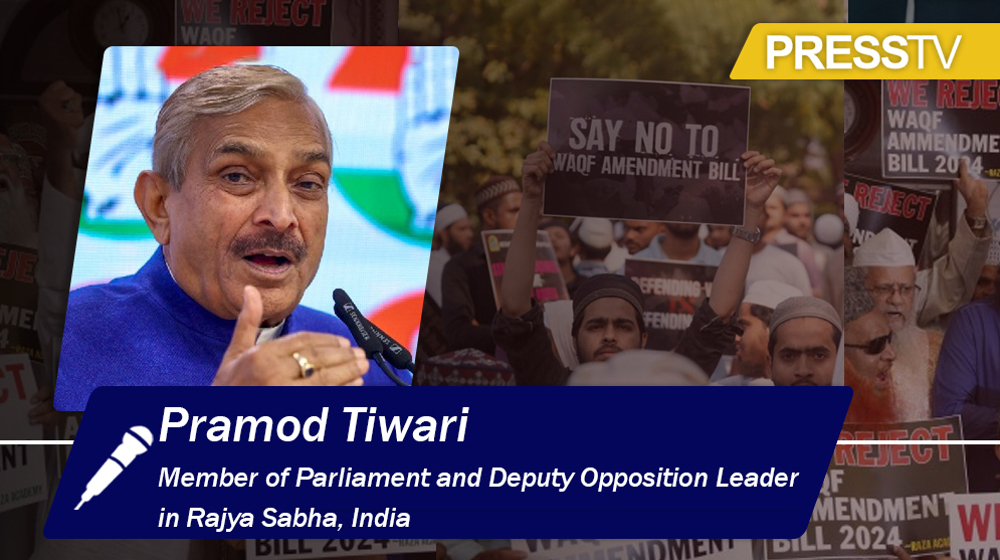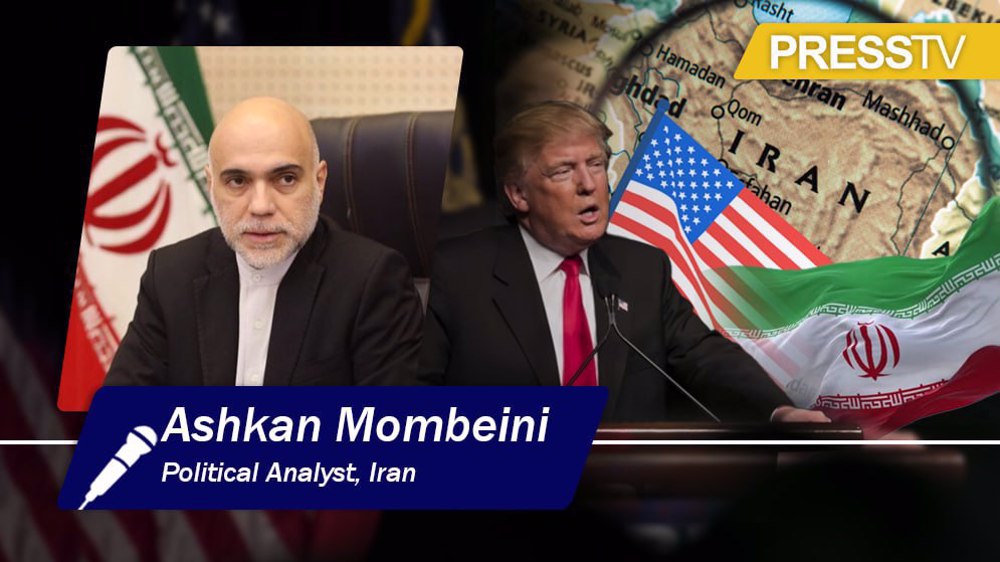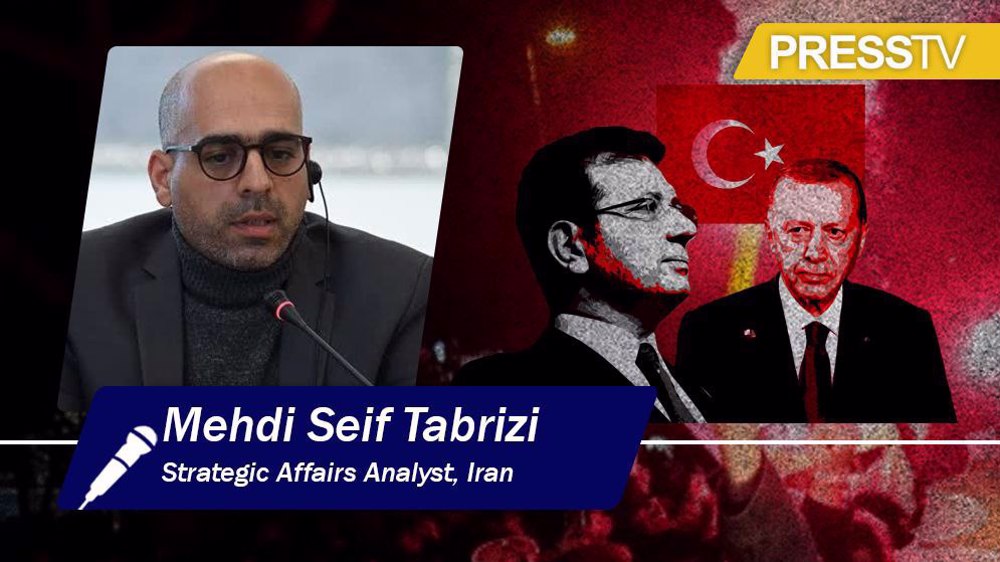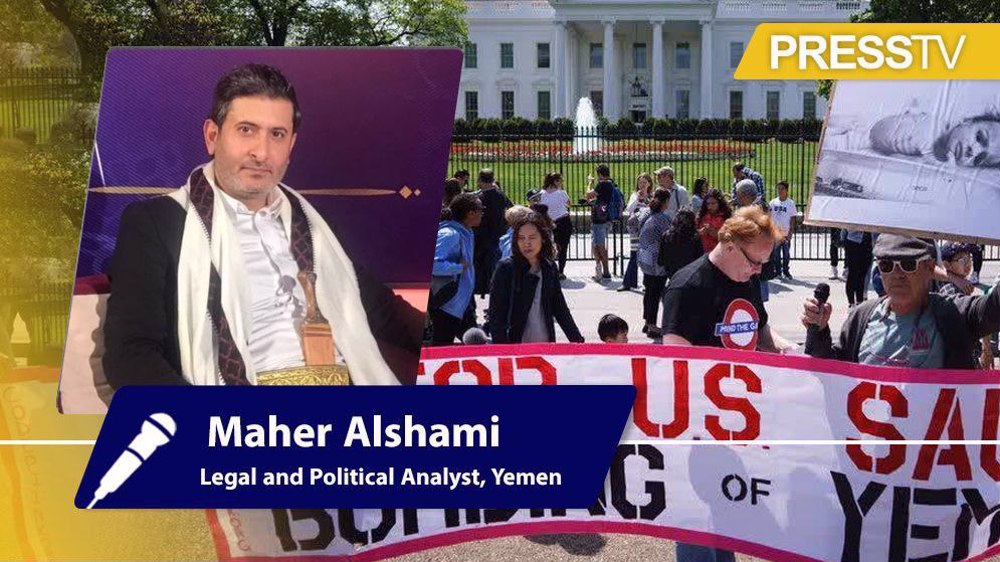Yemeni people, resistance foiled 'destructive plots' of US and allies: Analyst
By Ali Ghorban Bagheri
Yemeni people and the resistance movement foiled the sinister and destructive plots of the United States that were executed through a coalition of 17 countries in the form of military aggression and economic blockade of the Arab country, according to a Yemeni commentator.
Maher Al-Shami, a legal and political analyst based in Yemen, in an interview with the Press TV website, spoke in detail about what he termed “destructive schemes” of the US and its allies in the Arab country.
He said the people of Yemen, with the help of the country’s resistance movement, were able to defeat the “strategic objectives of the aggressors”, referring to the US and the Saudi-led coalition.
Saudi Arabia-led coalition, supported militarily by Western powers, launched a brutal onslaught on Yemen in March 2015, triggering a war that spawned the world’s worst humanitarian catastrophe.
Despite the US and other Western countries providing military, political and logistical support to Riyadh and its allies, aimed at reinstalling the former Saudi-loyal regime, the resistance prevailed in the end.
In recent months, especially after the restoration of ties between Iran and Saudi Arabia, efforts to end the protracted war in Yemen have also gained momentum with Riyadh and the Yemeni Ansarallah resistance movement currently engaged in peace talks mediated by Oman.
Al Shami said after the failure of America's “colonialist plans in the military and political fields in Yemen,” which were “mainly implemented by Saudi Arabia and the UAE,” the countries invading Yemen decided to “impose an economic blockade and take the livelihood of the Yemeni people hostage.”
The economic blockade, he added, was imposed after Sanaa's missile and drone capability “upset the battle equations and terrified Riyadh and Abu Dhabi.”
After years of failed military adventure in the Arab country, and in the wake of the Ukraine War that has forced the US and its Western allies to shift their focus toward Russia, Americans are now trying to de-escalate but also are not sincere in helping the ceasefire sustain.
Last week, the head of Yemen’s Supreme Political Council also accused Washington of sabotaging efforts aimed at easing tensions and ending the devastating war.
Mahdi al-Mashat said Washington seeks to obstruct any peace initiative to end the war in Yemen unless the plan conforms to its colonialist agendas in the war-ravaged Arab country.
Al Shami said the Yemeni leaders “understood the motives” of Washington and Riyadh regarding the ceasefire, so they made it “conditional on the resolution of humanitarian problems.”
He, however, hastened to add that the “aggressors” used the ceasefire “as a political lever and a tool to intensify the humanitarian crisis” in the country, and due to their refusal to comply with terms of the truce, especially in the area of humanitarian issues, the agreement was not extended.
The Yemeni analyst said Riyadh and Washington, while establishing the state of "neither peace nor war" and obstructing the negotiation process, “focused on imposing economic pressure and holding people's livelihoods hostage”, adding the objectives were to “weaken the social foundation, challenge Yemeni leadership, disrupt the country’s stability and security, fuel internal disputes and spread moral vices.”
On actions taken by the Yemeni leadership, Al Shami said it was able to “establish a new equation after the ceasefire”, which includes “preventing the looting of oil and gas resources”, “missile and drone units monitoring the movements of hostile forces in the occupied provinces” as well as “monitoring ships that seek to transfer energy resources.”
He hastened to add that Yemen’s unwavering position on separating humanitarian issues from political and military issues, making resolution of political issues conditional to the resolution of humanitarian issues, and the withdrawal of all foreign forces from the country “led Washington to strengthen its presence” in the occupied southern and eastern provinces, international port of Hodeidah “on the pretext of fighting terrorism.”
The legal observer also warned against American designs to divide the country as a new strategy to weaken the Yemeni leadership and said such moves will face a military response from the resistance.
“Sana'a will continue its battle for freedom and independence to maintain political independence and safeguard national sovereignty within the framework of a comprehensive national plan and will not accept the presence of foreign forces under any justification,” he remarked.
“The situation of "neither peace nor war" will not continue and if Riyadh does not use this opportunity to accept peace in Yemen, according to the leaders in Sana'a, a more powerful military option will be on the agenda compared to the operation to break the blockade.”
On the presence of US forces in Yemen, he said they have “no future except a humiliating defeat.”

Waqf Bill not just an attack on Indian Muslims but on India’s constitutional fabric: MP

Trump's war rhetoric against Iran to impose heavy costs on US and allies: Analyst

Turkey’s political unrest to significantly weaken Erdoğan’s grip on power: Analyst
Day of Rage: Hamas calls on all Palestinians to attend pro-Gaza rallies
Certain groups manipulating Iran-US talks, goading US into ‘maximalist demands’: FM
US warplanes strike Yemeni capital in new acts of aggression
‘A war crime’: UN blasts US envoy to Tel Aviv for defending Israel’s blockade on aid into Gaza
VIDEO | Press TV's news headlines
VIDEO | Pope Francis dies at 88 after 12 years as Catholic leader
VIDEO | US bombs Yemen’s capital in escalating military campaign
Iran condemns baseless GCC claims on 3 Persian Gulf islands







 This makes it easy to access the Press TV website
This makes it easy to access the Press TV website